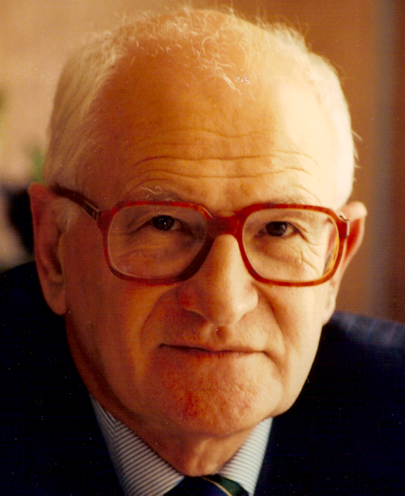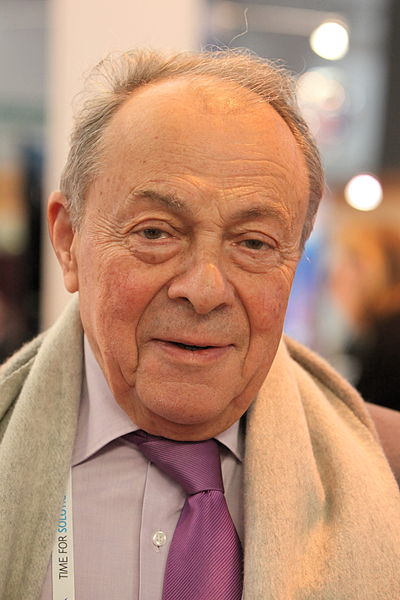<Back to Index>
- Minister of Relations with Parliament Jean Poperen, 1925
- Prime Minister of France Michel Rocard, 1930
PAGE SPONSOR

Jean Poperen (born 9 January 1925 in Angers; died 23 August 1997) was a French politician.
Poperen joined the Communist Party (PCF) at 18, and was also a member of the Union of Communist Students. He left the PCF after the Hungarian Revolution of 1956 and became a founding member of the Unified Socialist Party (PSU) in 1960. Disagreeing with the PSU's party line, he founded the Union of Socialist Groups and Clubs (UGCS). The UGCS participated in the Federation of the Democratic and Socialist Left and joined the new Socialist Party at the party's second national congress.
Poperen, a member of the party's left wing, was the party's second -
in - command from 1981 to 1987. Poperen also served in the Michel Rocard
government, and was PS deputy for the Rhône from 1973 to 1988.

Michel Rocard AC OQ (French: [miʃɛl ʁɔkaʁ]; 23 August 1930 – 2 July 2016) was a French politician and a member of the Socialist Party (PS). He served as Prime Minister under François Mitterrand from 1988 to 1991, during which he created the Revenu minimum d'insertion (RMI), a social minimum welfare program for indigents, and achieved the Matignon Accords regarding the status of New Caledonia. He was a member of the European Parliament, and was strongly involved in European policies until 2009. In 2007, he joined a Commission under the authority of Nicolas Sarkozy's Minister of Education, Xavier Darcos.
Rocard was born in Courbevoie, Hauts-de-Seine, to a Protestant family, the son of nuclear physicist Yves Rocard. He entered politics as a student leader whilst studying at Sciences-Po. He became chair of the French Socialist Students
affiliated to the main French Socialist party at the time, the French
Section of the Workers' International (SFIO), and studied at the École nationale d'administration (ENA), after which he chose to enter the prestigious Inspection des finances. As an anti-colonialist, he went to Algeria
and wrote a report regarding the widely ignored refugee camps of the
Algerian War (1954 – 62). This report was leaked to the newspapers Le Monde and France Observateur in April 1959, almost costing Rocard his job.
Having left the SFIO because of Guy Mollet's position towards the Algerian war, he led the dissident Unified Socialist Party (PSU) from 1967 to 1974. He was a prominent figure during the May 68 crisis, supporting the auto - gestionary project. He ran in the 1969 presidential election but obtained only 3.6% of the vote. Some months later, he was elected deputy for the Yvelines département, defeating the former Prime minister Maurice Couve de Murville. He lost his parliamentary seat in 1973, but retook it in 1978.
In 1973 – 74, he participated in the LIP conflict, selling watches with the workers and participating, behind the scenes, in the attempts to find an employer who would take back the factory, which was on the verge of being liquidated.
In 1974, he joined François Mitterrand and the renewed Socialist
Party (PS), which had replaced the old SFIO. Most of the PSU members and
a part of the French and Democratic Confederation of Labor (CFDT) trade union – the non-Marxist section of the left that Rocard famously defined as the "Second Left" – followed him.
Elected mayor of Conflans - Sainte - Honorine in 1977, he led the opposition to Mitterrand inside the Socialist Party (as a candidate of the right wing of the party). After the defeat of the left at the 1978 legislative election, he tried to take over the leadership of the party. In spite of his alliance with Pierre Mauroy, the number 2 of the PS, he lost at the Metz Congress (1979). As the Socialist Party's most popular politician at the time (including Mitterrand himself), he announced that he would run for president; but his "Call of Conflans" did not result in majority support within the PS, and he withdrew his candidacy. Mitterrand was the successful Socialist candidate in the 1981 presidential election.
From the 1970s to the 1990s, Rocard's group inside the Socialist Party, known as "les rocardiens", advocated a re-alignment of French socialism through a clearer acceptance of the market economy, more decentralization and less state control.
It was largely influenced by Scandinavian social democracy, and stood
in opposition to Mitterrand's initial agenda of nationalization,
programmed in the 110 Propositions for France. Nonetheless, the "rocardiens" always remained a minority.
Under Mitterrand's first presidency, he was Minister of Territorial Development and Minister of Planning from 1981 to 1983 and Minister of Agriculture from 1983 to 1985. He resigned from the cabinet in due to his opposition to the introduction of the proportional system for the legislative elections. He hoped, in vain, that Mitterrand would not run for re-election so he could be the PS candidate in the 1988 presidential election.
After Mitterrand's re-election, he was chosen as Prime Minister (May 1988 – May 1991).
Indeed, Rocard was popular and his position, on the right wing of the
PS, corresponded with the slogan of the electoral campaign, "a United
France". He formed a cabinet including 4 center right ministers. As
Prime Minister, he led the Matignon Accords regarding the status of New Caledonia,
which ended the troubles in this overseas territory. His record in
office also include a decrease in unemployment and a large-scale reform
of the welfare state's financing system. He created a minimum social
assistance scheme, the RMI, which helped to alleviate poverty.
Rocard's poor relations with Mitterrand, notably during his mandate as Prime Minister, were notorious. In addition, the Socialists only held a small parliamentary majority. In 1991, when his popularity decreased, President Mitterrand forced him to resign. However, according to Mauroy, who led the party, Rocard stood as the "natural candidate" for the following presidential elections. After the 1993 electoral disaster, he became leader of the PS by advocating a political "big-bang", that was to say a questioning of the left / right divide. His speech did not have the desired effect.
Rocard remained as leader of the Socialist Party for only one year,
in part because of the PS's complete defeat during the 1994 European
elections. The defeat was in part due to the success of the list of the Left Radicals Movement,
which was covertly supported by President Mitterrand.
Consequently, he was toppled by the left wing of the party and lost his
last chance to run for president the next year. Having lost his
deputy's seat in 1993, he became Senator of Yvelines from 1995 to 1997.
His supporters within the Socialist Party became allies of candidate
Lionel Jospin, who was Prime Minister in 1997 – 2002, and then Dominique
Strauss - Kahn.
Rocard was a member of the European Parliament (1994 – 2009), and chaired the Committee on Development and Cooperation (1997 – 1999), the Committee on Employment and Social Affairs (1999 – 2002) and the Committee on Culture, Youth, Education, the Media and Sport. Michel Rocard was known for his hostility for proposed directives to allow software patents in Europe, and has been an outspoken opponent of what he considers to be maneuvers to force the decision on this issue.
On the French political scene, Rocard presented himself as the political heir of Pierre Mendès - France, known for his moral rigor, and as the politician who "speaks the truth". After Mitterrand's death, he caused controversy when he said, about the former president, "he was not an honest man". An impersonator mocked him for his problems of elocution. In the run up to the presidential elections in 2007, Rocard called for an alliance between the Socialists and the centrist Union for French Democracy (UDF) party of François Bayrou in an effort to defeat Union for a Popular Movement (UMP) candidate Nicolas Sarkozy. Ségolène Royal, the PS candidate, rejected any such compromise, lamenting that she was once again obliged to face obstacles from within her own party. Rocard also publicly admitted, after the election, having asked Ségolène Royal to step down in his favor in March 2007, one month before the first round of voting.
Like other Socialist politicians, such as Jack Lang or Hubert Védrine, who accepted similar positions, Rocard accepted a post on the Committee on the re-evaluation of the teaching profession, which was placed under the "high authority" of Sarkozy's Minister of Education Xavier Darcos. Criticized by Medhi Ouraoui, national delegate of the PS, Rocard claimed it was a "democrat's duty" to participate in such Commissions and that he was "not concerned" by the "game of the President of the Republic [consisting of making of such left wing participations] political symbols". He furthermore explained that he had accepted to speak before the Gracques' spring university (a group of senior left wing civil servants who advocated a centrist strategy) because political parties were not suited any more to serious reflection. Finally, he again claimed that the (Marxist) SFIO had been created in 1905 on a fundamental "ambiguity", that of whether to accept or reject market economy.
He remained active in European Union politics as late as June 2014, when he delivered his thoughts on the British on the 70th anniversary of the D-Day landings in Normandy. Rocard quoted Churchill's words about the "United States of Europe", issued a strong condemnation of the UK policy of the 40 years to that date, and begged for a European strongman, which he saw in Martin Schulz. He concluded by inviting the UK to leave.
Rocard was also a supporter of the Campaign for the Establishment of a
United Nations Parliamentary Assembly, an organization which campaigns
for democratic reformation of the United Nations.
In June 2007, Rocard was admitted to the Calcutta Medical Research Institute, Kolkata, India where doctors found he had a blood clot in the brain and was operated upon. He was discharged from the hospital on 10 July 2007.
On 30 March 2012, Rocard was on a visit to Stockholm, Sweden to attend a meeting regarding the Arctic Council. During a break at noon, he became ill and was taken to the Karolinska University Hospital. Doctors decided later that day that Rocard should spend the night at the hospital's intensive care medicine unit for observation.
Rocard died on 2 July 2016 in Paris, at the age of 85.